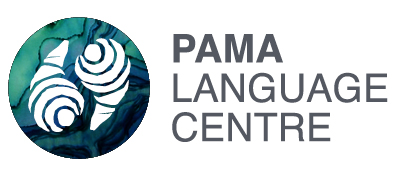Guugu Yimithirr Lesson 8
PRONOUNS TOGETHER WITH NOUNS
We have learnt some of the Guugu Yimithirr pronouns. We recall that a pronoun is a word that we use instead of repeating a name or some other word for a person.
Instead of saying “Johnny went to Cairns” we can say “He went to Cairns”. “He” is a pronoun that replaces “Johnny”.
In Guugu Yimithirr we sometimes say the pronoun together with the name or the word. This is a major difference between Guugu Yimithirr and English.
If we want to say “Johnny is Bama” we can say
Nhulu Johnny Bama.
Nhulu: “he” or “she”
Nhulu is the pronoun for “he” or “she”. It is used for living things; sometimes for a mythological being in a story, and sometimes an animal, especially when it is given a name.
In English we have the word “it”, which is very often used about dead things and animals. Guugu Yimithirr doesn’t have a pronoun like English “it”, but often nhayun, which means “that” is used.
But first we study the word nhulu. Listen to the pronunciation of the NH sound in nhulu:
Of course we can say just Johnny Bama (“Johnny is Bama”) or Nhulu Bama (“He is Bama”).
Lets put this pronoun, nhulu, is a sentence. The word for “policeman” is buliman:
The word for sick is “gagathirr”:
Now we can say the whole sentence: Nhulu buliman gagathirr
Literally we say “He policeman sick”. It is very common so say both the pronoun and the noun in Guugu Yimithirr.
Nhulu can be a man or a woman. Let’s learn a few more words to make another sentence:
Wun-guunh means “tomorrow”:
Gadaa means “come”, “arrive”:
Nhulu Agnes wun-guunh gadaa means “Agnes is coming tomorrow”:
Ngali: “we two”
We have learned the word for “we two”: ngali
The word ngali is used in the following way: You say the name of the other person and ngali. It is understood that you, the speaker, is the person whose name isn’t mentioned.
Ngali Agnes wun-guunh Canberrawi thadaa – “Agnes and I are going to Canberra tomorrow.
Here we learn the word for “go”: thadaa
Thadaa (“go”) and gadaa (“come”) rhyme, which make the words easier to learn.
If we are talking to a person we don’t need to say that person’s name when we use the pronoun ngali: Ngali thadaa! Let’s leave.
Let’s recapitulate. Ngali means “we too”. If the other person is not present, we say ngali plus her or his name. Ngali Agnes wun-guunh thadaa. – “Agnes and I are going tomorrow.”
If the other person is your interlocutor, you say only ngali: Ngali thadaa. – “Let’s go.”
Bula: “they two”
The pronoun bula means “they” – two people.
It is put between the names of the tow people you’re talking about.
Agnes bula Johnny Canberrawi thadaa – “Agnes and Johnny are going to Canberra”
Thana: they
Thana means “they” when we are talking about more than two people.
Thana is often used together with the word for the people you’re talking about. Let’s learn two words for a sentence. Nhila means “today, now”, and wuurilil means “playing”.
Thana Cowboys nhila football wuurilil means “Cowboys are playing football today”.
SUMMARY OF LESSON 8
We learn the pronouns that are often used together with the nouns we are referring to.
WORDS IN LESSON 8
nhulu – “he” or “she”
buliman – “policeman”
gagathirr – “sick”
wun-guunh – “tomorrow”
gadaa – “come”
bula – “they” (two people)
thadaa – “go”
thana – “they” (three or more people)
nhila – “now”
wuurilil – “playing”
GRAMMAR FACTS IN LESSON 8
Words that are used instead of nouns are called pronouns. In English we always skip the name or the noun when we use a pronoun. But the Guugu Yimithirr pronouns nhulu, ngali, bula and thana are often used together with the nouns or names we are referring to.
TEST YOURSELF
Now go to the Quizlet web site to practice what you learned in this lesson:
(End)
